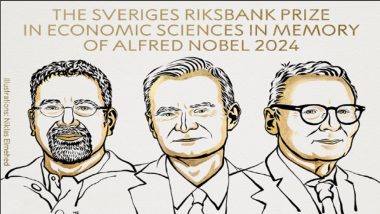Stockholm, October 12: The Nobel Prize in Economic Sciences 2020 was awarded to Paul R Milgrom and Robert B Wilson for improvements to auction theory and inventions of new auction formats. The duo have been awarded the honour as their theoretical discoveries have improved auctions in practice. This year’s Laureates, Milgrom and Wilson, have studied how auctions work. They have also used their insights to design new auction formats for goods and services that are difficult to sell in a traditional way, such as radio frequencies. Their discoveries have benefitted sellers, buyers and taxpayers around the world. Nobel Prize in Physics 2020 Winners: Roger Penrose, Reinhard Genzel and Andrea Ghez Receive The Honour For Their Discoveries on Black Hole.
“This year’s Laureates in Economic Sciences started out with fundamental theory and later used their results in practical applications, which have spread globally. Their discoveries are of great benefit to society,” says Peter Fredriksson, chair of the Prize Committee. Nobel Peace Prize 2020 Winner: World Food Programme Receives The Honour For Combating Hunger.
Here's the tweet:
BREAKING NEWS:
The 2020 Sveriges Riksbank Prize in Economic Sciences in Memory of Alfred Nobel has been awarded to Paul R. Milgrom and Robert B. Wilson “for improvements to auction theory and inventions of new auction formats.”#NobelPrize pic.twitter.com/tBAblj1xf8
— The Nobel Prize (@NobelPrize) October 12, 2020
Auction Theory
Using auction theory, researchers try to understand the outcomes of different rules for bidding and final prices, the auction format. The analysis is difficult, because bidders behave strategically, based on the available information. They take into consideration both what they know themselves and what they believe other bidders to know.
Robert Wilson's Contribution
Robert Wilson developed the theory for auctions of objects with a common value – a value which is uncertain beforehand but, in the end, is the same for everyone. Examples include the future value of radio frequencies or the volume of minerals in a particular area. Wilson showed why rational bidders tend to place bids below their own best estimate of the common value: they are worried about the winner’s curse – that is, about paying too much and losing out.
Paul Milgrom's Contribution
Paul Milgrom formulated a more general theory of auctions that not only allows common values, but also private values that vary from bidder to bidder. He analysed the bidding strategies in a number of well-known auction formats, demonstrating that a format will give the seller higher expected revenue when bidders learn more about each other’s estimated values during bidding.
Over the passage of time, societies have allocated ever more complex objects among users, such as landing slots and radio frequencies. In response, Milgrom and Wilson invented new formats for auctioning off many interrelated objects simultaneously, on behalf of a seller motivated by broad societal benefit rather than maximal revenue.
(The above story first appeared on LatestLY on Oct 12, 2020 03:38 PM IST. For more news and updates on politics, world, sports, entertainment and lifestyle, log on to our website latestly.com).













 Quickly
Quickly
















